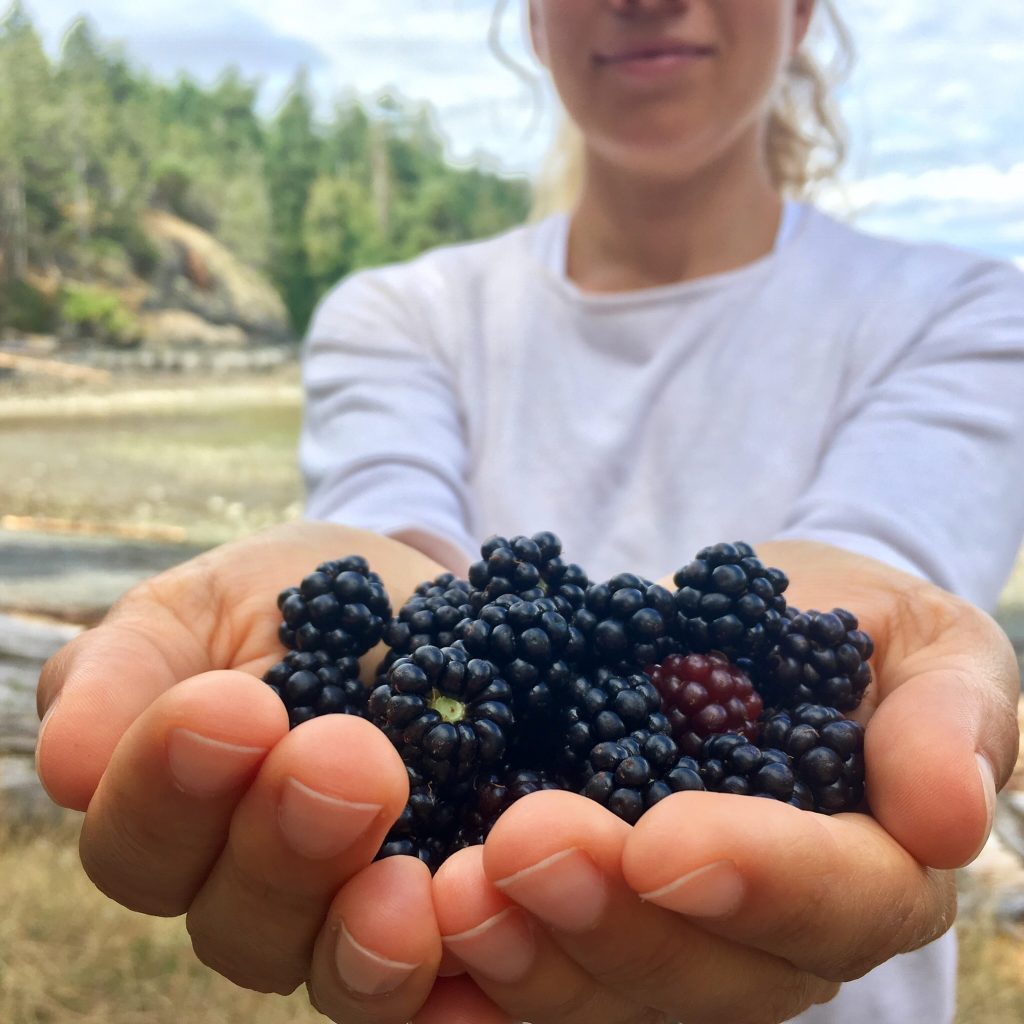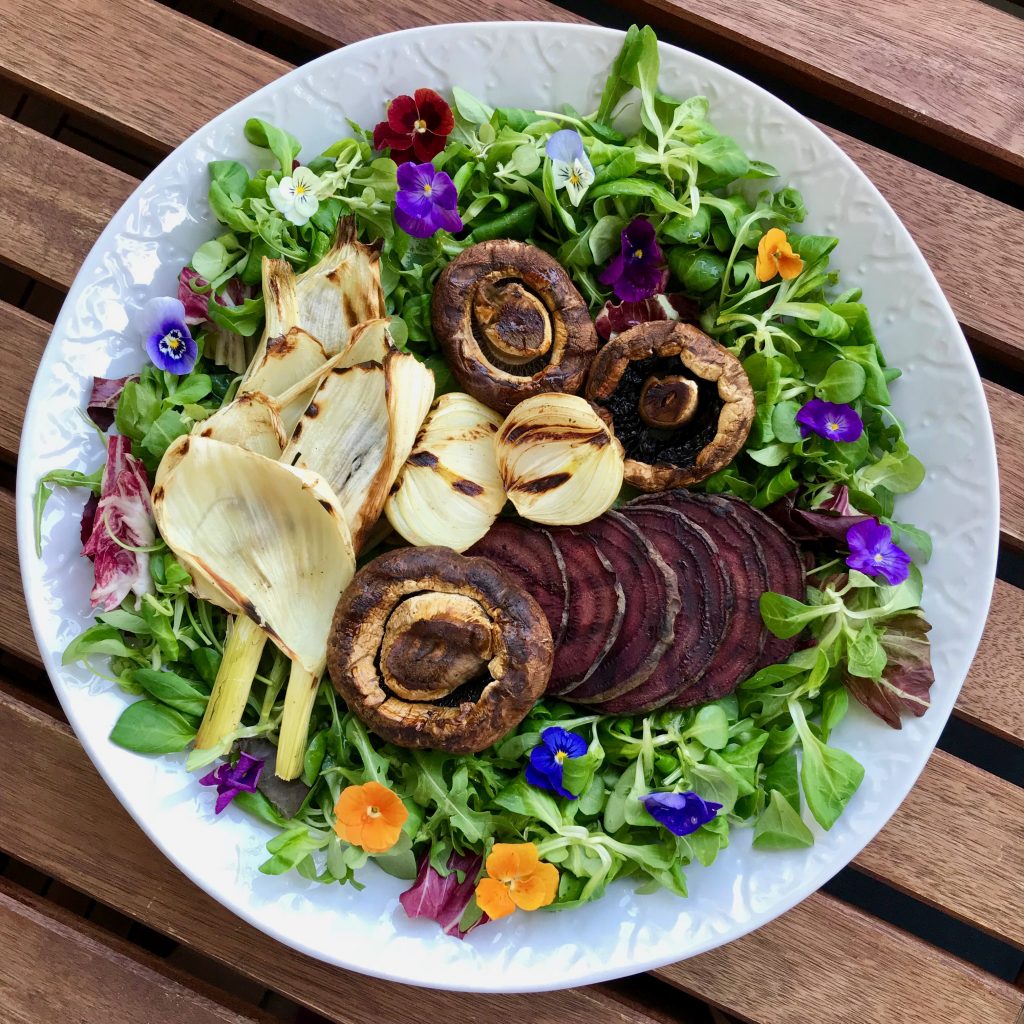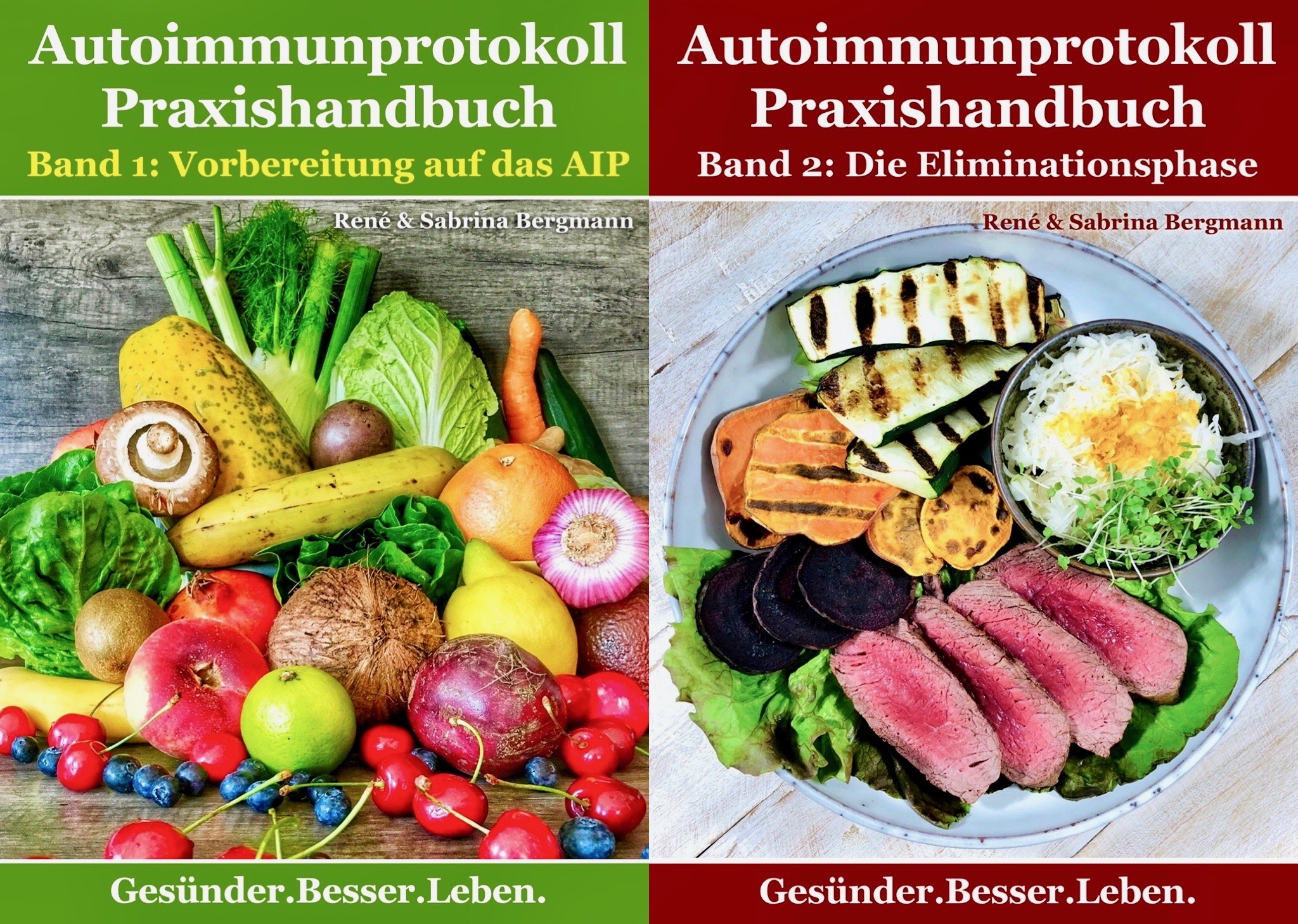Nutrivore [nutʁiˈvoːʁə]
Most of us learn hardly anything about nutrition. Unfortunately, this is often true within families as well as the educational system and medical training. As a result, there are a variety of different diets and many reasons to opt for, or against, their competing concepts. Sometimes there are heated debates among the supporters of the different movements.
For example, while some want to combat climate change by abstaining from meat, or simply want to be part of a meaningful movement, others are striving for the ideal nutrition plan or an ideal weight. Other reasons include the desire to simply eat what one likes or the necessity to maintain a frugal food budget and therefore shop on price alone. Our focus is on natural foods and nutrient density – we are a nutrivore family.

A barbecue with friends
We recently had friends over at our house and had a barbecue. We love this simple form of preparing food. First mushrooms, beetroot and fennel went on the grill, followed by sweet potato, zucchini and a few sausages. We had prepared a large salad with lots of greens, colorful carrots, red cabbage, herbs and, of course one of our favorite dressings, simple olive oil. While the grill did its job, we ate together and had a good time.
Later, we put liver on the grill instead of the usual steaks. Completely normal for us now. We love liver as a fantastic source of high quality protein, minerals and vitamins. But our friends were surprised. Although they tried it, it wasn’t love at first bite. The thought of offal in a meal was too unfamiliar, as was the typical smell. Even with the unexpected delicate consistency of the liver, their opinion didn’t change. Of course we wanted to make our guests happy but also wanted to pique their interest in our way of eating. So, we prepared a liver pâté and were rewarded with enthusiastic comments.
It is moments like this that remind us that we did not always eat as we do now. Our diet as well as our entire lifestyle is the result of a long journey. Much of what we know today, and naturally do every day, we take for granted. We often believe that all the people around us look at things exactly as we do. This assumption is far from reality. The impression is created by our own filtered perception and the bubble in which we all move. This is especially true when it comes to nutrition and exercise.
Processed foods, low-fat craze, and the omnipresents of grains
As teenagers we both were already interested in nutrition. The motivation then wasn’t necessarily our health but more our appearance and athletic performance. The little information we gleaned from sports magazines and publications by the German Nutrition Society led us to a high consumption of whole grains and poultry. Following the trends of the 90’s, we bought products with a very low fat content and many industrially processed foods. Our range of consumed vegetables was rather small. For our vitamin supply, we relied more on exotic fruits and multivitamin supplements.

This doesn’t feel like this was us, looking back at it today, somehow unreal, like watching a movie. At that time though we thought we were doing the right thing for our bodies. Our juvenile metabolism and participating in multiple sports saved us from being overweight. By those standards we were physically fit and “healthy” but never completely satisfied with our physical performance.
Getting rid of grain and milk
A decade later we began to suspect that our nutrition wasn’t serving us the way we were hoping it would. It was getting harder for us to stay in really good shape. We were having more and more problems digesting whole-grain bread and cow’s milk. We lacked iron and healthy fats. Through experience and trial and error, we naturally arrived at a diet without grains and cow’s milk. Instead, we integrated more vegetables and red meat. Convenience products slowly disappeared from our kitchen.
When the concept of the Paleo diet reached Germany, we found that our eating habits were quite similar. Suddenly, our nutritional style had a name and a growing movement. The anthropological approach seemed logical to us. However, meat was increasingly the subject of discussion. Within our family, ethical aspects clashed with physical needs and athletic demands.
Back to a species-appropriate and natural diet with the autoimmune protocol
During this time, just before going on a vegetarian diet, we came across the concept of the autoimmune protocol. Not only did it radically change our view of the various autoimmune diseases within the family, it also left us critically scrutinizing all aspects of our current lifestyle: nutrition, sleep, stress, cosmetics and household goods all the way to sustainable consumption and recycling.
In our eyes, the most far-reaching and sustainable of our lifestyle changes has been the full conversion to organically produced foods
With this decision we were able to make a direct contribution to the protection of our soils, our ground water and the dying insects, while at the same time providing our bodies with the healthiest food available – a wonderful feeling. We quickly realized that not all organic produce is equal. We were increasingly looking for food from regenerative agriculture and pasture-raised production. Increasingly, we looked for seasonal and local produce. At the same time we began searching for the highest possible variety and yield of nutrients.

Suddenly we began to experiment more in the kitchen. We tried all the fruits and vegetables that were available. That was, and is, so much fun. Above all, it tastes great. We talk to each other a lot about our diet, plan and cook together, and enjoy so much more. Through all these changes we nourish our bodies and can live well with an autoimmune disease, full-time jobs, family and sports. We feel totally comfortable and cannot imagine any other way of eating. We do not miss anything and do not feel restricted. There is no room for wistful longing for convenience products. We simply enjoy the feeling of living in healthy and strong bodies.
How we understand the nutrivore concept
Many people in the industrialized world choose their food according to their „gut feeling.” Criteria such as taste, linked emotions, stimulating or calming effect or even the feeling of satiety for the lowest price determine what they eat. The nutrivore, however, follows a clear rational approach. Sensory factors such as taste or smell remain important criteria. In addition, a nutrivore also considers the nutrient density of a food and establishes a connection to its own current supply status and to its own nutritional requirements. For this, one needs a good sense of physical being as well as a solid knowledge about the essential ingredients in the available foods.
A nutrivore diet, as we understand it, strives for the best possible nutritional supply in relation to one’s daily physical exertion and general state of health. The goals are balanced health and performance for body and mind which should continue throughout one’s lifetime. Through targeted composition, it is possible to create very tasty, nutritious and healthy meals that are completely natural in their individual components. The nutrivore concept fully lives up to the true meaning of the word nutrition because it fuels, nourishes and cares for our bodies with all the necessary nutrients for the demands of life in our respective environment.
The nutrivore concept provides a rational solution to a problem of human civilization that did not exist before the neolithic revolution: making the right choice between unnatural, that is industrially processed and artificial, and real, that is species-appropriate and healthy, food. Unfortunately, in our industrialized world we can no longer rely on evolved decision patterns. For example, we have an innate passion for all things sweet – an inheritance from an age when humans had hardly any access to starchy tubers, sweet fruits or honey. Today, modern humans eat sugar in excess and could not be further from the origin of a natural diet. Anyone who indulges in unlimited amounts of sugar will sooner or later have to pay for it with their health.
Choosing a nutrivore diet means embarking on an exciting journey: learning about your own body, about foods – their origin and their ingredients – about renewable farming and environmental protection. The nutrivore lifestyle is a very fulfilling and sustainable one. It raises awareness about well-being, the environment and the effects of one’s actions.
How we live the nutrivore concept day by day
We mainly look for unprocessed and fresh produce which is in season and locally grown. This often means that we go grocery shopping several times a week. We consciously take our time. Since we live in a hectic big city and often have a tight schedule, we try to see grocery shopping as a time of relaxation and appreciation for our food. Almost everything we eat on a working day we either take from home or buy fresh from an organic supermarket.
Aside from that we pay close attention to all those colorful vegetables and fruits, as they provide us with those valuable phytochemicals. So beside deep green leaf lettuce we enjoy red radicchio or red cabbage. We buy yellow, orange and purple carrots. Zucchini, beets, broccoli, cauliflower and sweet potatoes are most often on our shopping list. In the right season, there are various leaf lettuces such as dandelion or wild garlic, a lot of fresh kale, and pumpkin and kohlrabi.

As you can see, we mostly eat veggies, and fruits, not as often, but consistently. We especially love fresh berries. If exotic fruits are available, we aim for red grapefruits and kiwis. Mushrooms are also an integral part of our diet, as well as fermented foods.
Our meat we get from a farm where the animals are pasture-raised. We are convinced that only animals that are raised in an appropriate way will provide us with healthy meat. This is why we went to the farm to see how they raise and treat their animals. Today we have our meat and offal delivered from this farm directly to our home.
We cook almost every day but very simple meals. Taking up most of our time in the process is the cleaning and chopping of the ingredients. We often grill our vegetables and meat. In fact, we actually do that all year round. We like to roast in a large iron pan, bake in the oven or make huge, colorful salads. But over time we have also learned a lot in the kitchen: the preparation of liver pâté, for example, or the fermentation of vegetables. This is really fun and gives us the certainty that we have only the best quality.
The nutrivore concept stands for sustainability, awareness and a wonderful body image
In our eyes the fascinating part of the nutrivore concept is the rational examination of what we allow in the innermost part of our body. Both the choice as well as the food itself are determined by appreciation, attention and tranquility. We do not eat just anything and not while we are busy with other things.
In fact, we thoroughly enjoy our food today and what is most important: we find it delicious. We are not on a time-limited diet and live a sustainable, and at the same time, very fulfilling, nutrition-wise lifestyle. This becomes very obvious when we see that our daughter has completely internalized this concept. We do not have to cajole or forbid her to eat anything. She enjoys a healthy diet and she very critically examines the eating habits of her school friends. We find that remarkable. At the same time, it makes us very proud and happy.
Our family´s favorite time of the day is dinner time
This is when we all meet in the kitchen, prepare our food together, and talk about our day and the things that moved us. This meal is emotionally connected by a wonderful feeling in our stomachs and to the harmonious relationship with the people we love. For us, this as well, is part of the nutrivore philosophy.

The food selection process may sound cumbersome at first but in practice it feels natural and relaxed. What did I not have enough from today or not at all? Did I have enough protein, enough vegetables, sour foods, bitter substances, chlorophyll, vitamins, minerals? The decision comes naturally with a little routine.
Being a nutrivore also means being one with your own body – loving, caring, and giving it all it needs for a long and healthy life. We want to be active and enjoy life to the fullest. This is why we are so excited about the nutrivore concept and why we want to encourage everyone – with and without autoimmune disease – to try it out.
